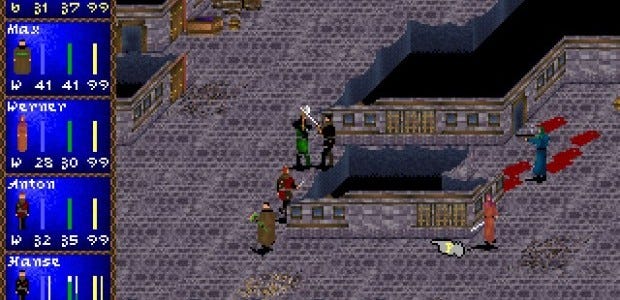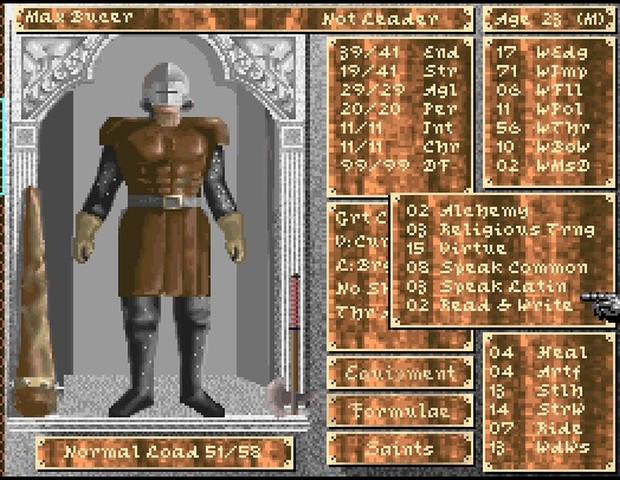Darklands Retrospective: What RPGs Are Supposed To Be
Bohemian Laxity
A lesson that often eludes the games industry is how much names matter. Though it's hardly the worst offender, Darklands is about as generic as a name gets, and its cover image (which mattered once) is even worse.
Even discounting that, it faced an uphill struggle, as its original 1992 release was marked by a plague of bugs, which Microprose's patching never entirely expunged. It can still fritz during longer, complex sections - the ones you'll save at most - and its occasional glitches compound cumbersome controls and an interface that's awkward and often repetitive. Its sounds are few and its animations simplistic, with minimal feedback. On paper, it's a bit of a mess.
It's one of the best RPGs ever made anyway.
I could say it's because the setting is original and unique, which it is. It's a largely realistic depiction of greater Germany in the 15th century, with scores of towns, authentic currency, and even time itself based on literally canonical hours. “RTFM” is a cliché, but here a fair warning, as that kind of detail makes for a daunting opening. It is fortunately a lovely one, from that line of 90s manuals that featured a completely unnecessary educational section, with a full bibliography. Don't say games never taught me anything, Mum.
I could also say it's the absence of levels, XP, and over-abstracted stats, which are cast out entirely in favour of characters defined by dozens of skills, and progression that ebbs and flows with your success and misfortune. While better quality equipment helps in a fight, it's choosing the right tool that matters most. There's no comparison of every sword against every other sword you pick up here. Instead you decide based on your skills, and whether you value fast attacks, higher raw damage, or better armour penetration - a battleaxe might be cool and mop up the cannon fodder, but it'll simply bounce off the plate armour that knight's wearing.
Weapons and armour are expensive, and while there's no regular degradation, some events and enemy attacks can damage them permanently. And if you lose a fight or surrender, don't think anyone will hesitate to strip you naked and take every pfennig you own. And those are the merciful ones. But hey, some of your party survived that encounter, right? So, dust yourselves off, recruit some replacements, and get back on that horse.
Because here, I could say its greatness comes from character creation, done not via a preset menu, but by choosing a social class and a series of jobs. A young noble who goes into the priesthood, leaves to peddle goods, then falls on hard times and banditry? Go for it! You can focus or generalise as you like. Every career grants guaranteed points in certain skills, and extra ones to divide up among a narrower range.
A clerk could dedicate these to more literacy, or brush up on archery. Soldiers get a broad fighting education, then an opportunity to specialise in (say) polearms, or instead round out with a sliver of stealth and theology. And that soldier could work for another 10 years, gaining rarer or more balanced skills in exchange for her declining physique, or join up now and prove herself on the road. You can't create a perfect team anyway, so even that skilled priest and healer had better learn to defend himself.
After creation, characters grow, decline, and die. Every skill can increase through use or study, but can be decimated by events, poor decisions, or some of the nastier enemy attacks. Everyone will age, inevitably declining, and perhaps being voluntarily retired before their luck runs out. And it will. If your wounded group staggers from a fight into a wolf attack, don't think they won't chow down on one or two of your people while you limp away. Werner might have been a great swordsman and scholar, but he's gone now. Resurrection? What are you, a satanist? Anton, fetch my crossbow. We got ourselves a devil-lover.
You've probably guessed that this "I could say it's x" schtick is going to end with an "it's ALL of those things, and then some". Well, it is. There's just so much going on in Darklands that hasn't really been done since.
It's neither dragged under the realism bus by pedantry, nor throwing awkward modern concessions or fantasy generica in where it feels wrong. It's instead a unique interpretation of history and mythology; a world that's half reality, half folklore and dogma. Violence and often arbitrary law rule the cities, but commerce is rising, and you'll seek out more bankers than knights or kings. Elves and orcs don't exist, but weird, wild creatures occasionally appear in the forests. The devil is real, and he will mess you up.
Spells and magic aren't real, though alchemy is a highly specialised, expensive and powerful discipline. Potions require a formula and chemicals, plus time to brew, and can still result in disaster. The other stand-in for magic is prayer, with dozens of saints to supplicate for stat bonuses, or direct intervention during events. Both require ongoing study of knowledge that's scarce and jealously guarded in universities and monasteries, who'll require generous 'donations' for even a peek of a tutor. The church's authority is absolute, and not unlike King of Dragon Pass, you need to accept that doctrine.
If a bishop is abusing his position to take money from people... you'd better pay up. Refuse and his people will attack, and a virtuous soul would never fight a man of the cloth. Conversely, devil worshippers must be slaughtered without pity - they eat babies, you know. No, really. There's an event where you can foil their plans by secretly baptising the babies.
I haven't even touched on its approach to choice. Players of KoDP will recognise another element in its random event screens, your primary means of interacting with the world. Most give you several options, though whether you have the skills to pull them off is another matter. While a talented and well-equipped group can tackle most situations, these choices are often no less dangerous than combat.
I recently had a guard in Rottweil falsely accuse me of some vague criminal act, and protesting my innocence kicked off a fight. This knackered my reputation there, and when I returned I snuck in to claim my reward (it was a huge reward), but was recognised at the market. This time I came quietly, and was clapped in chains and sentenced to death. Game over? Nope.
They started executing my team, one by one. All I could do was struggle and hope to break free. By sheer fluke Gertrude did, and happened to be lethal with a dagger. A quick, desperate knife fight later, she and Anton fled to the docks and swam to freedom. The reward? I'd converted it into a promissory note before we were captured. It paid for new armour and weapons for us, the nun and the semi-reformed swindler we recruited in Strassburg. Back on the horse.
Darklands is great for more reasons than I can breathlessly enthuse about. It's entirely open world, with endless jobs and events, and everything from Luxembourg to Marienburg open from day one. Your only goal is a heroic reputation - which is tracked globally and locally - you can be a hero in Stuttgart, an outlaw in Rheims, and completely unknown in a dozen towns in between. Even today that's something few RPGs attempt. There's also a long main quest that's completely optional, after which you're free to play on indefinitely.
It is, in short, what games are supposed to be. For all its flaws and frayed edges, it still shines with the love and ambition spelled out in that manual, and it richly deserves the follow-ups that sadly never came.














